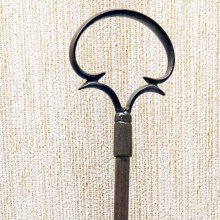Daraka, Dāraka, Dārakā: 18 definitions
Introduction:
Daraka means something in Buddhism, Pali, Hinduism, Sanskrit, the history of ancient India, Marathi. If you want to know the exact meaning, history, etymology or English translation of this term then check out the descriptions on this page. Add your comment or reference to a book if you want to contribute to this summary article.
Images (photo gallery)
In Buddhism
Mahayana (major branch of Buddhism)
Source: Wisdom Library: Maha Prajnaparamita SastraDāraka (दारक) refers to a “young man”, according to the 2nd century Mahāprajñāpāramitāśāstra chapter 1.—Accordingly: [...] If the Bodhisattva were able to walk and talk as soon as he was born, people would say: “This man that we see is extraordinary, he must be a god, a nāga or a demon. [...]”. Victims of their own modesty, these people cannot become firm adepts of the holy Dharma. It is for them that the Buddha is born in the Lumbinīvana.—Although he might have gone directly to the tree of enlightenment and become Buddha there, he pretended by skillful means to act as a child, as an adolescent, as a young man (dāraka) and as a grown man. [...]
Source: academia.edu: A Study and Translation of the GaganagañjaparipṛcchāDāraka (दारक) refers to “boys”, according to the Gaganagañjaparipṛcchā: the eighth chapter of the Mahāsaṃnipāta (a collection of Mahāyāna Buddhist Sūtras).—Accordingly: “Then the Bodhisattva Apāyajaha addressed himself to the Bodhisattva Gaganagañja: ‘Son of good family, please pacify three evil existences’. [...] Then, the rain of gifts, such as flowers, garlands, incenses, unguents, aromatic powers, religious robes, parasols, banners, pennons, five kinds of musical instruments, songs, male servants, female servants, wives, boys (dāraka), girls, female attendants, horses, elephants, [...] poured down from the open space. [...]”.
Source: De Gruyter: A Buddhist Ritual Manual on AgricultureDāraka (दारक) refers to the “boys”, according to the Vajratuṇḍasamayakalparāja, an ancient Buddhist ritual manual on agriculture from the 5th-century (or earlier), containing various instructions for the Sangha to provide agriculture-related services to laypeople including rain-making, weather control and crop protection.—Accordingly, [when the Bhagavān reached the vicinity of the residence of Vaiśravaṇa], “[...] All people, women, men, boys (dāraka) and girls (dārakā), cattle, horses, mares, buffaloes, elephants, camels, donkeys and so on became delighted by comfort. That lotus lake had an expansion of two yojanas and [a depth of] a fathom all around in the four directions. [...]”

Mahayana (महायान, mahāyāna) is a major branch of Buddhism focusing on the path of a Bodhisattva (spiritual aspirants/ enlightened beings). Extant literature is vast and primarely composed in the Sanskrit language. There are many sūtras of which some of the earliest are the various Prajñāpāramitā sūtras.
India history and geography
Source: Cologne Digital Sanskrit Dictionaries: Indian Epigraphical GlossaryDāraka.—(IA 18; CII 1), explained as ‘the son of a king, whose mother's rank does not assure him an official title’. Note: dāraka is defined in the “Indian epigraphical glossary” as it can be found on ancient inscriptions commonly written in Sanskrit, Prakrit or Dravidian languages.

The history of India traces the identification of countries, villages, towns and other regions of India, as well as mythology, zoology, royal dynasties, rulers, tribes, local festivities and traditions and regional languages. Ancient India enjoyed religious freedom and encourages the path of Dharma, a concept common to Buddhism, Hinduism, and Jainism.
Languages of India and abroad
Pali-English dictionary
Source: BuddhaSasana: Concise Pali-English Dictionarydāraka : (m.) a boy; youngster.
Source: Sutta: The Pali Text Society's Pali-English DictionaryDāraka, (Sk. dāraka, cp. dāra & Gr. dou=los (slave)) a (young) boy, child, youngster; a young man. f. dārikā girl (see next) Vin.I, 83; J.I, 88 (dārake ca dārikāyo boys & girls); II, 127; VI, 336; Pv.I, 127 (=bāla° PvA.65); DhA.I, 99 (yasa°=yasa-kulaputta); Miln.8, 9; PvA.176.—frequent as gāmadārakā (pl.) the village-boys, streeturchins J.II, 78, 176; III, 275.

Pali is the language of the Tipiṭaka, which is the sacred canon of Theravāda Buddhism and contains much of the Buddha’s speech. Closeley related to Sanskrit, both languages are used interchangeably between religions.
Marathi-English dictionary
Source: DDSA: The Molesworth Marathi and English Dictionarydaraka (दरक).—m ( A) A common term for the higher hereditary public offices, esp. for eight; viz. kāra- bhārīmukhatyāra or divāṇa, mujumadāra, phaḍanīsa, sabanīsa, kārakhānanīsa, ciṭanīsa, jāmadāra, pōtanīsa.
Source: DDSA: The Aryabhusan school dictionary, Marathi-Englishdaraka (दरक).—m A common term for the higher hereditary public offices.
Marathi is an Indo-European language having over 70 million native speakers people in (predominantly) Maharashtra India. Marathi, like many other Indo-Aryan languages, evolved from early forms of Prakrit, which itself is a subset of Sanskrit, one of the most ancient languages of the world.
Sanskrit dictionary
Source: DDSA: The practical Sanskrit-English dictionaryDaraka (दरक).—a. Timid, cowardly.
--- OR ---
Dāraka (दारक).—a. (-rīkā f.) [दॄ-ण्वुल् (dṝ-ṇvul)] Breaking, tearing, splitting; दारिका हृदयदारिका पितुः (dārikā hṛdayadārikā pituḥ).
-kaḥ 1 A boy, a son. (-kī) A girl, a daughter; कथं नु दारका दीना दारकीर्वा- परायणाः । वर्तिष्यन्ते मयि गते भिन्ननाव इवोदधौ (kathaṃ nu dārakā dīnā dārakīrvā- parāyaṇāḥ | vartiṣyante mayi gate bhinnanāva ivodadhau) || Bhāgavata 4.28. 21.
2) A child, infant.
3) Any young animal.
4) A village hog.
Source: Cologne Digital Sanskrit Dictionaries: Shabda-Sagara Sanskrit-English DictionaryDāraka (दारक).—mfn.
(-kaḥ-kā-kaṃ) A breaker, a tearer. m.
(-kaḥ) 1. A son. 2. A child, an infant or young animal. 3. The charioteer of Vishnu. 4. A village-hog. f.
(-rikā) 1. A daughter. 2. A whore. E. dṝ to tear, affix ṇvul .
Source: Cologne Digital Sanskrit Dictionaries: Benfey Sanskrit-English DictionaryDāraka (दारक).—i. e. dṛ10 + aka, I. adj., f. rikā, Splitting, Mahābhārata 7, 6871. Ii. f. rikā, A chap, [Suśruta] 1, 292, 10.
--- OR ---
Dāraka (दारक).—m. 1. A son, [Pañcatantra] 100, 24. 2. A young animal, [Bhāgavata-Purāṇa, (ed. Burnouf.)] 5, 8, 17. 3. du. A boy and a girl, Brāhman. 2, 35.
Source: Cologne Digital Sanskrit Dictionaries: Cappeller Sanskrit-English DictionaryDāraka (दारक).—1. [feminine] rikā rending, splitting (—°); [feminine] also = 1 dāra.
--- OR ---
Dāraka (दारक).—2. [masculine] boy, son, a young animal; [dual] two boys or a boy and a girl. [feminine] dārakā (dārakī) girl, daughter.
Source: Cologne Digital Sanskrit Dictionaries: Monier-Williams Sanskrit-English Dictionary1) Daraka (दरक):—[from dara] mfn. timid, aftaid, [cf. Lexicographers, esp. such as amarasiṃha, halāyudha, hemacandra, etc.]
2) Dāraka (दारक):—[from dāra] 1. dāraka mf(ikā)n. breaking, tearing, splitting (cf. lohaand śatru-)
3) [v.s. ...] m. a hog, [cf. Lexicographers, esp. such as amarasiṃha, halāyudha, hemacandra, etc.]
4) [v.s. ...] Name of Kṛṣṇa’s charioteer (cf. [i.] dāruka), [cf. Lexicographers, esp. such as amarasiṃha, halāyudha, hemacandra, etc.]
5) [from dāra] 2. dāraka m. (rather connected with 2. dāra than with √dṛ) a boy, son, child, [Mahābhārata; Mṛcchakaṭikā; Pañcatantra; Suśruta]
6) [v.s. ...] young animal, [Purāṇa]
7) [from dāra] m. [dual number] (akau) a boy and girl, [Nalopākhyāna]
Source: Cologne Digital Sanskrit Dictionaries: Yates Sanskrit-English DictionaryDāraka (दारक):—(kaḥ) 1. m. A son, a child; Vishnu's charioteer; a hog. f. (rikā) A daughter; a whore. a. Breaking, tearing.
Source: DDSA: Paia-sadda-mahannavo; a comprehensive Prakrit Hindi dictionary (S)Dāraka (दारक) in the Sanskrit language is related to the Prakrit words: Dāra, Dāṇa, Dāraya.
[Sanskrit to German]
Sanskrit, also spelled संस्कृतम् (saṃskṛtam), is an ancient language of India commonly seen as the grandmother of the Indo-European language family (even English!). Closely allied with Prakrit and Pali, Sanskrit is more exhaustive in both grammar and terms and has the most extensive collection of literature in the world, greatly surpassing its sister-languages Greek and Latin.
Kannada-English dictionary
Source: Alar: Kannada-English corpusDāraka (ದಾರಕ):—
1) [noun] a male child.
2) [noun] a young man.
Kannada is a Dravidian language (as opposed to the Indo-European language family) mainly spoken in the southwestern region of India.
See also (Relevant definitions)
Starts with (+1): Darakacarya, Darakacharya, Darakada, Darakadara, Darakali, Darakana, Darakanem, Darakantika, Darakapatti, Darakara, Darakarman, Darakarmman, Darakaru, Darakarupa, Darakasa, Darakastu, Darakatikiccha, Darakattu, Darakavanem, Darakavani.
Ends with (+49): Adaraka, Andaraka, Ardaraka, Ashvavrindaraka, Avadaraka, Bhamdaraka, Bhartridaraka, Bharttridaraka, Bhukarbudaraka, Bidaraka, Brimdaraka, Bruddhadaraka, Cudaraka, Dandaraka, Dardaraka, Driddhadaraka, Gamadaraka, Gopaladaraka, Gopashadaraka, Govrindaraka.
Full-text (+42): Darika, Lohadaraka, Pashanadaraka, Darakacarya, Vriddhadaraka, Karidaraka, Bhartridaraka, Darakadara, Patradaraka, Munidaraka, Bharttridaraka, Praveshita, Hastivallia-daraka, Vidaraka, Padadarika, Thanasita-daraka, Shankhadaraka, Pashanatarakam, Bhartridarika, Gopashadaraka.
Relevant text
Search found 22 books and stories containing Daraka, Dāraka, Dārakā; (plurals include: Darakas, Dārakas, Dārakās). You can also click to the full overview containing English textual excerpts. Below are direct links for the most relevant articles:
Rasa Jala Nidhi, vol 4: Iatrochemistry (by Bhudeb Mookerjee)
Part 23 - Treatment for indigestion (21): Sarvamayaghna rasa < [Chapter IV - Irregularity of the digesting heat]
Treatment for fever (143): Maharaja rasa < [Chapter II - Fever (jvara)]
Part 27 - Treatment for enlargement of spleen and liver (26): Bari-shosana rasa < [Chapter VII - Enlargement of spleen (plihodara) and liver (yakridudara)]
Maha Prajnaparamita Sastra (by Gelongma Karma Migme Chödrön)
Act 9.7: Samantaraśmi starts his journey to the Sahā universe < [Chapter XV - The Arrival of the Bodhisattvas of the Ten Directions]
Act 9.3: Question of the bodhisattva Samantaraśmi < [Chapter XV - The Arrival of the Bodhisattvas of the Ten Directions]
Act 10.6: Samantaraśmi and his entourage pay homage to Śākyamuni < [Chapter XV - The Arrival of the Bodhisattvas of the Ten Directions]
Satirical works of Kshemendra (study) (by Arpana Devi)
5.18. The Teacher of the Child (dāraka-upādhyāya) < [Chapter 5 - Kṣemendra’s objectives of Satire]
Vaisheshika-sutra with Commentary (by Nandalal Sinha)
Sūtra 5.1.11 (Non-volitional action, not a cause of virtue or vice) < [Chapter 1 - Of Voluntary Action]
Trishashti Shalaka Purusha Caritra (by Helen M. Johnson)
Part 3: Story of the Yakṣa and painter < [Chapter VIII - Initiation of ṛṣabhadatta and devānandā]
Vinaya Pitaka (1): Bhikkhu-vibhanga (the analysis of Monks’ rules) (by I. B. Horner)

